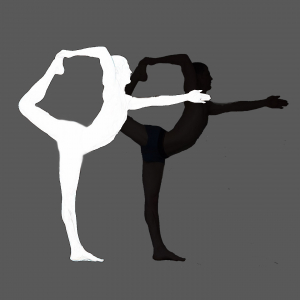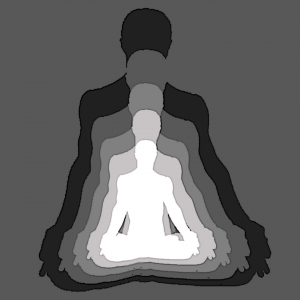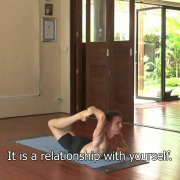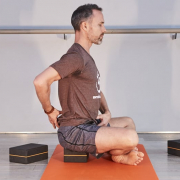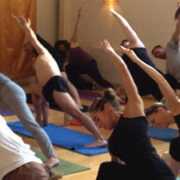 https://samahitaretreat.com/wp-content/uploads/2018/05/kids-yoga4-e1527838240346.jpg
765
1192
Daniel Stringer
http://samahitaretreat.com/wp-content/uploads/2024/01/samahita-logo-v2.svg
Daniel Stringer2018-06-03 05:14:062022-11-28 10:37:216 Tips to Balance Practice and Parenting
https://samahitaretreat.com/wp-content/uploads/2018/05/kids-yoga4-e1527838240346.jpg
765
1192
Daniel Stringer
http://samahitaretreat.com/wp-content/uploads/2024/01/samahita-logo-v2.svg
Daniel Stringer2018-06-03 05:14:062022-11-28 10:37:216 Tips to Balance Practice and Parenting5 Signs your Yoga Practice is on the Wrong Track

Have you hit a wall with your yoga practice? Do you ever wonder why you are doing this and wether it’s truly beneficial? Sometimes our motivation to practice is not entirely clear or well understood. You may be experiencing negative feedback in physical or psychological form. This blog highlights a few common traps and offers advice to get back on track
1. Pain
You’re committed, ambitious and competitive. Dedicated to your practice, getting up every morning without fail or taking those 3 classes in a row at the studio. All is well and your friends comment on how much improvement you’ve made until one day you’ve hurt your knee, wrist, lower back and shoulder! Maybe its time to calm things down and reflect on the true motive behind your effort. Dedication and commitment are commendable qualities in anyone assuming it’s not a form of self harm. Ahimsa (non-harming) applies to how we treat ourselves as much as anyone else.
On another level a certain amount of discomfort is to be expected when beginning a new kind of practice or finding your boundaries but we must do so with intelligence, sensitivity and respect for our physical and emotional condition. After all, growth requires getting out of our comfort zone and discovering ways to improve.
2. Boredom
In the beginning it was exciting to discover something new. A fun practice with an entertaining teacher and great music. But as the weeks draw on you lose interest and momentum. So what went wrong? In this scenario the yoga class has an entertaining and social purpose which is fun for a while but in the long run we need something with value and depth that inspires and challenges us on a deeper level. Gives us something to work with and find growth.
Another scenario could be practicing and struggling the same method until feeling no progress is being made. This is often due to high expectations or a misunderstanding of what type of development is possible in the practice. It will bring us back to the recurring question of why we chose to practice in the first place.
3. Negative attitude
Who’s that girl in the front row? Wearing you-know-what and showing off all those fancy asanas? Never mind, get on with your own practice and focus on your own issues. Often we’re projecting our shadow self onto others who reflect our repressed characteristics back onto us. How often have you visited a teacher who spends most of their time complaining about other teachers or other methods? This tendency is common to us all and the remedy here is to be honest about our motives, to look deeply within ourselves and give others space to be themselves.
Or perhaps you’re overly critical of yourself with unrealistic goals or expectations. Yoga gives us the tools to shine a light on who we are and in many cases our subconscious throws up many surprises. Whatever comes up – own it, accept yourself for who you are and transcend negative behavioural patterns.
4. Exhaustion
Similar to pain and injury but this time experiencing complete energetic and emotional exhaustion. Of course there are many factors in life that will bring us to exhaustion and yoga is often seen as a remedy, and indeed it is, depending on your approach. High expectations with a competitive nature could easily take its toll. In order for yoga to work as a therapy for our emotional and spiritual condition we must approach it with respect. Overdoing the asanas or taking too many particularly hot or intense classes can be detrimental to your overall condition. Enjoy the many facets of a fully rounded yoga practice including pranayama, meditation and relaxation (don’t forget Savasana). A busy teaching schedule will also take its toll so make sure you’re well prepared and adequately nourished. Take a balanced approach with yoga as an integral part of your life and work.
5. Neglect
Another side effect of over commitment. You may have a busy life with many responsibilities and finding the time to practice can be challenging. In some cases we will have to sacrifice other activities or appointments but, most people would agree, our fundamental commitments such as family and work should be met. Discovering a new love in yoga or spiritual practice allows us to look honestly and realistically at our life to realise what is truly important and deserves our full attention. We should approach our practice with a healthy dose of non-attachment or Vairagya. Sharing or dedicating the fruits of our efforts becomes an enjoyable and fulfilling purpose in our life.
More from the Samahita Blog
